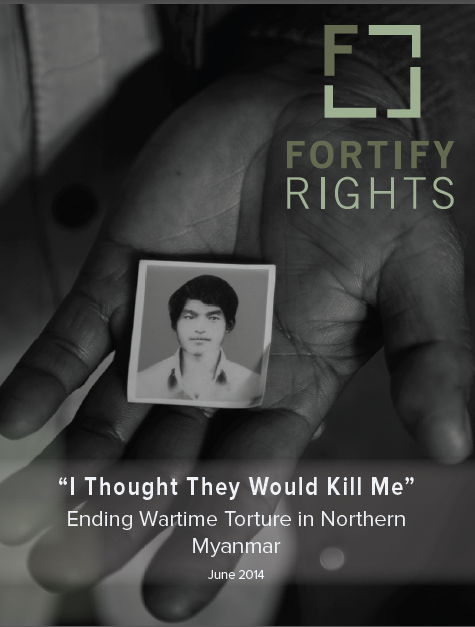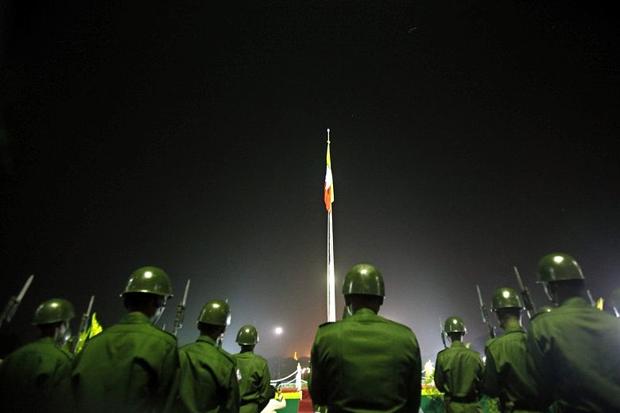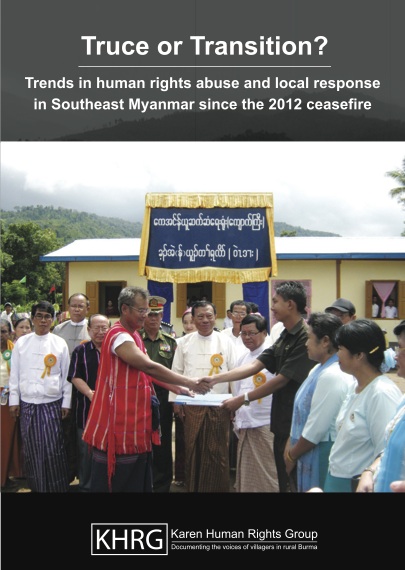Posts Tagged ‘Burma Army’ (238 found)
Myanmar: End Wartime Torture in Kachin State and Northern Shan State
 (Yangon)— For the past three years, Myanmar authorities have systematically tortured Kachin civilians perceived to be aligned with the Kachin Independence Army (KIA), Fortify Rights said in a new report released today. Fortify Rights believes these abuses constitute war crimes and crimes against humanity. The government of Myanmar should intervene immediately to end the use of torture in the conduct of the ongoing war in Kachin State and northern Shan State, and it should credibly investigate and prosecute members of the Myanmar Army, Myanmar Police Force, and Military Intelligence who are responsible for the serious crimes described in this report.
(Yangon)— For the past three years, Myanmar authorities have systematically tortured Kachin civilians perceived to be aligned with the Kachin Independence Army (KIA), Fortify Rights said in a new report released today. Fortify Rights believes these abuses constitute war crimes and crimes against humanity. The government of Myanmar should intervene immediately to end the use of torture in the conduct of the ongoing war in Kachin State and northern Shan State, and it should credibly investigate and prosecute members of the Myanmar Army, Myanmar Police Force, and Military Intelligence who are responsible for the serious crimes described in this report.
The 71-page report, “I Thought They Would Kill Me”: Ending Wartime Torture in Northern Myanmar, describes the systematic use of torture and other cruel, inhuman, and degrading treatment or punishment (“ill treatment”) of more than 60 civilians by Myanmar authorities from June 2011 to April 2014. Members of the Myanmar Army, Myanmar Police Force, and Military Intelligence deliberately caused severe and lasting mental and physical pain to civilians in combat zones, […]
• • •Myanmar: Three Years on, Conflict Continues in Kachin State
Three years after the Myanmar armed forces resumed offensive military operations in Kachin state, Amnesty International joins human rights defenders and civil society organizations to call for an immediate end to violations of international humanitarian law and human rights law. The continued fighting and reports of crimes under international law and human rights violations allegedly committed by the Myanmar Army raise serious questions about commitment to human rights reforms in the country and threaten ongoing efforts to negotiate a nationwide ceasefire […]
• • •55 Organisations Worldwide Call for Action for Peace on Kachin Anniversary
Three years ago today, the Burma Army broke a 17-year ceasefire with the Kachin Independence Army (KIA) and unleashed a major new military offensive against the Kachin people. Since 9 June 2011, over 120,000 Kachin people have been displaced, forced to flee their homes. At least 200 villages have been destroyed. A humanitarian emergency unfolded, with a desperate need for shelter, food and medical care. As the Kachin Peace Talk Creation Group has said, “the impact of the war this time has been enormous. Many have lost land, plantations […]
• • •The Pressure is Working
Dear friend
There has just been a success in our campaign to help end rape and sexual violence by the Burmese Army.
The Burmese government has just become the 150th country to sign the Declaration of Commitment to End Sexual Violence in Conflict. The declaration contains practical and political commitments to end impunity, promote accountability, and provide justice and safety for victims of sexual violence in conflicts […]
• • •Statement by the Kachin Women’s Association Thailand on the Third Anniversary of the Renewed Conflict in Kachin State
KWAT is very concerned at the recent escalation of attacks by the Burma Army in southern Kachin and northern Shan State, which have caused fresh displacement and suffering. These systematic operations to seize control of key trade routes and economic zones along the China-Burma border throw strong doubt on the government’s sincerity towards the peace process […]
• • •Adequate Security and Assistance Needed Before Refugees Return
Members of the European Burma Network are deeply concerned that refugees from Burma living in camps in Thailand are being pressured to return to Burma prematurely because of cuts in aid […]
• • •Statement of Shan Nationalities League for Democracy (SNLD)
1) On May 5, 2014 at around 8:00 PM, Sai Ai Keng @ Ai Kyein, chairman of village-level SNLD from Namlinmau village, Pengtao Tract, Keng Tung Township, was beaten, abducted and arrested by government soldiers of the 245th Infantry Battalion […]
• • •Truce or Transition? Trends in Human Rights Abuse and Local Response in Southeast Myanmar Since the 2012 Ceasefire
In January 2012, the Myanmar government and the Karen National Union (KNU) signed a preliminary ceasefire agreement, bringing to a halt what is often referred to as the world’s longest-running civil war. This conflict engendered severe human rights abuse of civilians at the hands of a range of armed actors, primarily at those of the Myanmar Armed Forces (Tatmadaw). The ceasefire and other recent political developments in Myanmar have altered the ways in which human rights abuse is experienced by Karen people in the Southeast, and transformed the context within which these abuses can be addressed. This report aims to demonstrate how trends in human rights abuse have changed during the post-ceasefire period […]
• • •More Transparency Required Regarding Burma Army’s Operations
 As documented on countless occasions by many local and international groups, the Burma Army has long been committing serious human rights abuses in ethnic areas of Burma, especially recently in Kachin State. Such abuses include waging war against civilians, summary executions, torture and mutilations, rape and other sexual violence against women, men and children, arbitrary detention, destruction of homes and property, and the blocking of humanitarian access. Such abuses terrorise local populations, undermine trust and confidence in the current peace process, and are illegal under international law. Furthermore, many of these human rights abuses could also be classified as war crimes or crimes against humanity […]
As documented on countless occasions by many local and international groups, the Burma Army has long been committing serious human rights abuses in ethnic areas of Burma, especially recently in Kachin State. Such abuses include waging war against civilians, summary executions, torture and mutilations, rape and other sexual violence against women, men and children, arbitrary detention, destruction of homes and property, and the blocking of humanitarian access. Such abuses terrorise local populations, undermine trust and confidence in the current peace process, and are illegal under international law. Furthermore, many of these human rights abuses could also be classified as war crimes or crimes against humanity […]
Burma Campaign UK Reports Ministry of Defence For FOI Breach Re Burma Military Training
Burma Campaign UK has filed an official complaint with the Information Commissioner regarding the failure of the British Ministry of Defence to properly respond to a Freedom of Information (FOI) request regarding training being given to the Burmese Army […]
• • •









 All posts
All posts